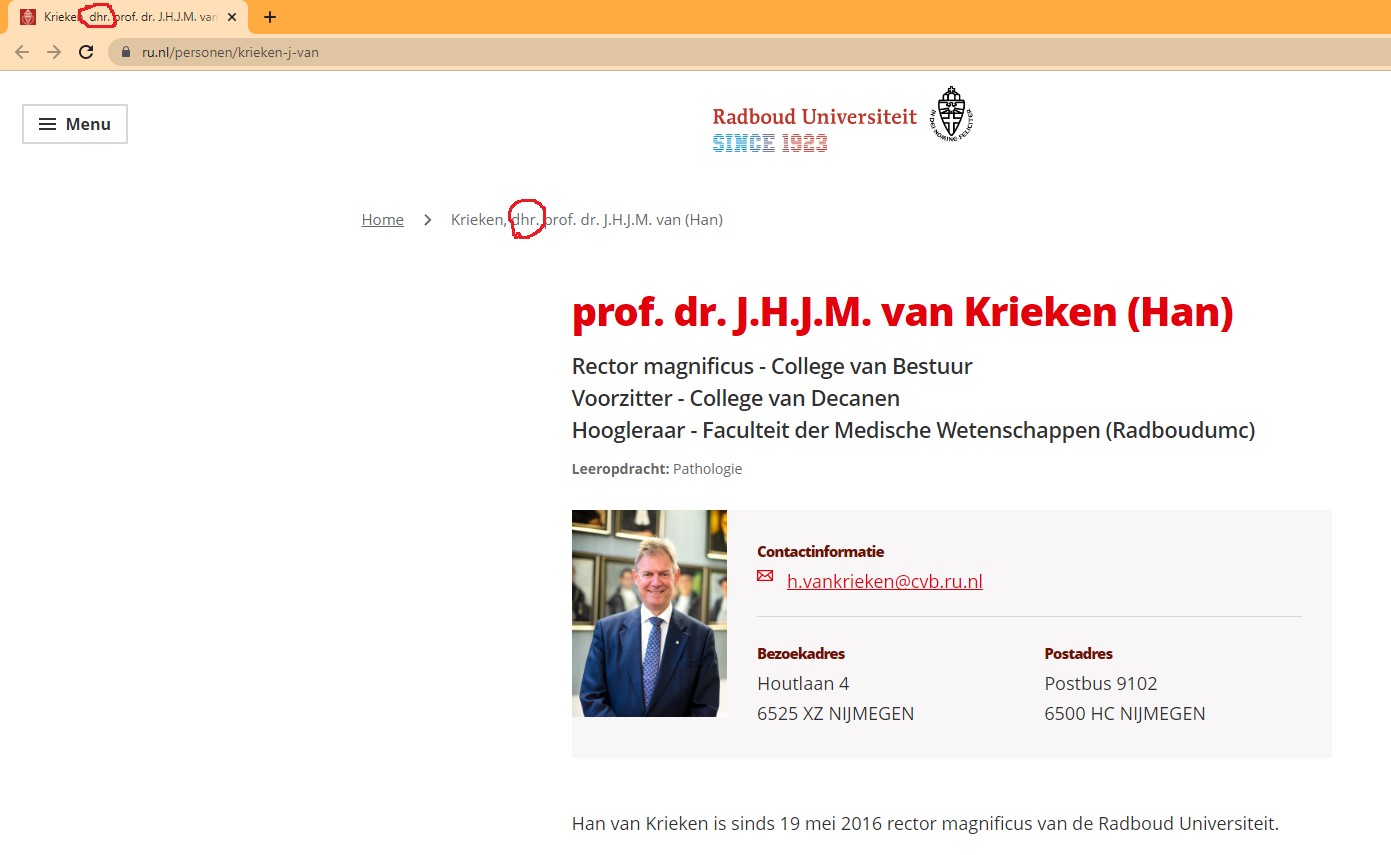‘New Radboud University website forces employees into a gender binary’
-
 Illustratie: Eveline Schram
Illustratie: Eveline Schram
OPINION - Radboud University forces all of its employees into a binary conception of gender on its website. That is what Lynn de Rijk, Mieke Breukelman and Mark Dingemanse of the Faculty of Arts say. Employees are automatically classified as 'Dhr.'/'Mevr.' (sir/madam) on their Dutch profile pages. 'This is a privacy violation, undermines the existence of non-binary people and goes against the university’s own diversity policy.'
If you’re one of the many thousands of Radboud employees with a Dutch profile page, you’ll find that it will inevitably classify you as either ‘Dhr.’ (sir) or ‘Mevr.’ (madam). You don’t have a say in this and you cannot change or remove it. Whoever tries anyway is in for a months-long search and friendly email exchanges that culminate in ‘computer says no’.

You might not expect it from an organisation with diversity officers and a Gender Equality Plan that strives for ‘a gender approach that recognizes intersectionality’. Yet it happens on the new website of Radboud University: every single employee is straitjacketed into archaic gendered forms of address. There is no choice outside these binary forms. In fact there is no choice at all: you can’t even edit this field yourself, as the website takes it straight from an internal personnel database.
Only Dutch university
So every Dutch profile page of every Radboud employee has a gendered address form, whether it is rector magnificus ‘Krieken, dhr. prof. dr. J.H.J.M. van (Han)‘ or vice-dean and gender equality expert ‘Vleuten, mevr. prof. dr. J.M. van der (Anna)‘. Even those who do not have their own page, like Chief Diversity Officer Dr. Jualla-Van Oudenhoven, will still be gratuitously gendered by the website’s search function. The gendered address forms are especially prominent for people with fewer titles, and they are also displayed in the title of browser tabs.
Who needs this archaic form of address? No other Dutch university does it this way. Worse, it forces everyone into the same binary straitjacket, including non-binary people and anyone who, for whatever reason, does not feel at home in this dichotomy. This means the new website directly contradicts the explicit aim of the RU towards inclusion. Nor is it a legacy feature: nothing like this happened on the old website, so it is a curious choice.
At least as dubious is the fact that employees have no control over this field on their own profile pages. It is taken from an internal database, which in turn is linked to data from the pension fund and the tax authorities. Private data —assigned sex at birth, or ASAB— is made public without people’s consent. That such data has been publicised raises questions about information security and privacy procedures at the university.
Kafkaesque scenes
An archaic form of address on profile pages: it is the kind of boring mixup that could have been silently remedied long ago. But apparently more pressure is needed. This story starts with one of us, Lynn, who is referred to as ‘Mevr.’ on the Radboud website but does not use that form of address. As a new PhD student, Lynn sends a friendly email to HR in September 2022 asking whether this can be adjusted so that people who come across the page are not misled. An amiable email exchange follows, but without resolution.
Linked profiles
The mandatory gendered forms of address appear on Dutch pages wherever profiles are linked — also research projects. Breukelman is involved in a project about ‘dealing with uncertainty in gender incongruence and DSD/intersex conditions’ and there, too, the gendered address forms show up.
In this context the archaic forms are not just unnecessary, they also look like a statement by the researchers: as if there is only a clear-cut dichotomy. This is detrimental to the research, because it can scare off potential participants.
A month later, fellow PhD student Mieke also sounds the alarm, now with an email to the Communication department: the problem arises when creating a web page for a research project on diversity in sex and gender (see box). Mieke gets the advice to report the issue to HR so that ‘hopefully it will be given more priority’.
In February 2023, the matter comes up at lunch and the third of us (Mark) files a complaint with HR. The complaint is ‘received’ and promptly ‘passed on’. Not that it resolves the matter. A good month later, we decide to take it up with a higher organizational level, which leads to more diversions. Most striking in the whole process is that names quickly give way to faceless entities. For instance, we receive the following cryptic advice: ‘The tip from Central is to keep sending complaints to HR’.
Technically, the problem is trivial to solve. On the English profile pages, things already are as they should be: no gendered form of address to be found. The reason for this is as hilarious as disturbing: because the internal database records ASAB but not marital status, ’they could not work out whether to call someone Miss or Mrs so they just left it out altogether’. Apparently we were only a hair’s breadth away from going fifty years back in time and being classified as Female-Available, Female-Married, or Male!
Bureaucratic systems
According to the latest update, ’the request is with ILS’ and ‘an adjustment in the portal’ is needed. Copying a few lines of code across templates, doing some tests, and hitting ‘deploy’: doing this might take a day or two, so it is hard to see why it would take half a year. Here is how we read what the system is telling us: in six months of being sent from pillar to post, somehow not a single person cared enough about this matter to just give the go-ahead and get it fixed.
Speaking of people: we did encounter many of them in our search for a solution, and most were exceedingly understanding and compassionate. Yet in the end we all run into the same wall: a place where names and faces give way to abbreviations and systems, and where organisational structures become so unwieldy that they have grown out of our control. This is how bureaucratic systems organise our work and thereby keep us from working.
It is of course problematic that a university website in 2023 forces all of its employees into a binary straitjacket, and does so publicly and without consent. But it is also a symptom of something bigger. A website that does this —that is made to work like this— reflects a system that deep down doesn’t want to see us. But we don’t want to accept that. We, the employees of Radboud, are the university. Behind all those organizational charts and abbreviations there are people. Dear ILS colleague who can help us out by editing that template, where are you? You have a part to play!



